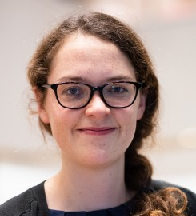Rose Penfold
As a Registrar in Geriatrics and General Medicine, I often see the individual and societal challenges multimorbidity poses for our ageing population. During my fellowship, I will be studying interactions between multimorbidity and delirium: prevalent conditions in hospitalised older adults, with adverse effects on individual function, independence and future trajectory.
During my academic-clinical training so far, I have developed interest in understanding relationships between frailty and physical and cognitive ageing. During my recent NIHR Academic Clinical Fellowship at the Department of Twin Research, King’s College London, I was joint first-author of “Probable Delirium is a Presenting Symptom of COVID-19 in Frail, Older Adults”, Age and Ageing (2020). This observational, multi-cohort study using “citizen science” and routine clinical data was my first exposure to data-driven research at scale. I was excited to see direct clinical and policy impacts of our study, which led to changes in national COVID-19 testing policy for older adults and incorporation of systematic frailty screening at my trust for all adults aged >65 years old. I also undertook research highlighting the importance of age and frailty as predictors of post-vaccination COVID-19 infection, as well as research which identified a more appropriate fever threshold for older adults for suspecting infection.
Alongside research, I am actively involved in promoting academic geriatric medicine and supporting gender equity in academia and leadership. As a recent representative for the British Geriatrics Society Research and Academic Development Committee, I remain committed to developing the next generation of research-active trainees and continue to work with the national trainee-led Geriatric Medicine Research Collaborative. I completed a scholarship-funded Master of Public Health in Health Policy at Harvard University in 2018 and subsequently applied this experience as a National Medical Director’s Clinical Fellow at NHS England and NHS Improvement, working across national policy-making organisations on projects to support the medical workforce. I am a co-founder of Women Speakers in Healthcare - a grassroots initiative committed to gender balance across health and social care, now with over 800 database speakers.
I am excited to be part of this inaugural cohort of the Multimorbidity PhD programme. This fellowship will be pivotal in supporting my growth as an independent academic geriatrician, capable of leading research into the needs of our ageing, multimorbid population. A collaborative, cross-cutting approach is vital, not only to enable us to do better for our patients as healthcare professionals but also to catalyse changes in policy to improve health at the population-level.
My PhD project “Multimorbidity, delirium, and outcomes in hospitalised patients: a big data project using routine clinical and national audit data” will be based at the Usher Institute, University of Edinburgh, supervised by Professor Alasdair MacLullich and team.
This data-driven project will utilise large-scale community and hospital data for >50000 admissions, as well as national audit data from the Scottish Hip Fracture Audit. The main aims are to understand how multimorbidity influences delirium risk and how delirium influences outcomes in those with multimorbidity in exemplar groups of hospitalised patients.
Project: Multimorbidity, delirium, and outcomes in hospitalised patients: a big data project using routine clinical and national audit data
Primary Supervisor: Prof Alasdair MacLullich (University of Edinburgh)
Secondary Supervisors: Prof Bruce Guthrie, Dr Atul Anand and Mr Andrew D Duckworth (University of Edinburgh)


